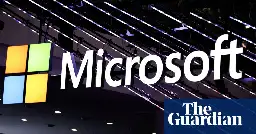Slow recovery from IT outage begins as experts warn of future risks
Slow recovery from IT outage begins as experts warn of future risks

Slow recovery from IT outage begins as experts warn of future risks

Fault in CrowdStrike caused airports, businesses and healthcare services to languish in ‘largest outage in history’
Services began to come back online on Friday evening after an IT failure that wreaked havoc worldwide. But full recovery could take weeks, experts have said, after airports, healthcare services and businesses were hit by the “largest outage in history”.
Flights and hospital appointments were cancelled, payroll systems seized up and TV channels went off air after a botched software upgrade hit Microsoft’s Windows operating system.
It came from the US cybersecurity company CrowdStrike, and left workers facing a “blue screen of death” as their computers failed to start. Experts said every affected PC may have to be fixed manually, but as of Friday night some services started to recover.
As recovery continues, experts say the outage underscored concerns that many organizations are not well prepared to implement contingency plans when a single point of failure such as an IT system, or a piece of software within it, goes down. But these outages will happen again, experts say, until more contingencies are built into networks and organizations introduce better back-ups.

Here's an idea: don't give one company kernel level access to the OS of millions of PCs that are necessary to keep whole industries functioning.
I mean, Microsoft themselves regularly shits the bed with updates, even with Defender updates. It's the nature of security, they have to have that kind of access to stop legit malware. That's why these kind of outages happen every few years. This one just got to much coverage from the banking and airline issues. And I'm sure future outages will continue to get similar coverage.
But the Crowdstrike CEO was also at McAfee in 2010 when they shit the bed and shut down millions of XP machines so it seems like he needs a different career...
The problem is the monoculture. We are fucking addicted to convenience and efficiency at all costs.
A diverse ecosystem, if a bit more work to manage, is much more resilient, and wouldn't have been this catastrophe.
Our technology is great, but our processes suck. Standardization. Just in time. These ideas create incredibly fragile organizations. Humanity is so short sighted. We are screwed.
This happened to me in December 2022/January 2023. Pretty similar problem. Just a regular Windows update caused it. Weirdly it didn't affect everyone (and I'm not on any sort of beta channels). Installing KB5021233 keeps causing BSOD 0xc000021a.
I’m not sure you can blame the CEO. As much as I despise C-level execs this seems like a failure at a much lower level. Now the question of whether this is a culture failure is a different story because to me that DOES come from the CEO or at least that level.
How difficult would it be for companies to have staged releases or oversee upgrades themselves? I mostly just use Linux but upgrading itself is a relatively painless processing and logging into remote machines to trigger an update is no harder. Why is this something an independent party should be able to do without end user discretion?
So we should have five different cyber security solutions at any given site?
Crowdstrike was near ubiquitous because it was the best tool out there. And plenty of threats were prevented because of it.
The answer isn't to force every single site to manage everything themselves. It is to increase oversight on ci/CD models
I read his comment more about the kernel level access more than the one company.
I understand the reason for it, but that ubiquity comes with potential dangers, as we saw on Friday. But, no, I don't think the solution is "five different cyber security solutions" at every site. However, different cyber security solutions for different industries might not be such a bad idea. Or, I suppose the root of the problem might be the ubiquity of the OS. Should every PC be running the same jack of all trades but master of none OS?
Also the obligatory: "don't run infrastructure on Microsoft products, run Linux"